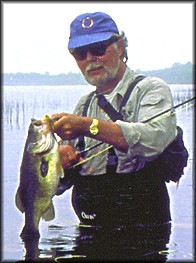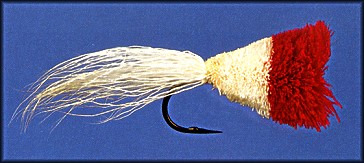This fly was one of my dad's (Tap Tappley) favorites. I've selected
it . . . from an uncountable number of possibilities because they are
all relatively easy to make and require common and inexpensive
materials. . . If you'd rather carve, sand and paint cork or balsa, use
preformed hard - or soft-foam bodies, or fool around with Corsair than
spin, pack, and clip deerhair, simply follow these intructions,
substituting those other bodies for the deerhair ones. You'll end up
with essentially the same bug.
Materials List:
- Hook: Standard bass-bug hook, such as Tiemco #8089,
sizes 4- 2/0.
- Thread: Kevlar or Danville's Flymaster Plus.
- Tail: Stiff, coarse hair from the base of a deer's tail.
- Body: Deer body hair, spun and clipped.
Tying Instructions:
1. Wind the thread onto the rear of the hook. Do not cover the entire shank.
2. Tie in a generous sprig of coarse bucktail by its butts at the top of the bend,
making a tail about the length of the hook. The butts will flare.
3. Working forward to the eye of the hook, spin and pack deerhair over the
bare hook shank until you run out of room.
4. Whip-finish behind the eye, cut off the thread, and add a drop of head
cement to the windings.
5. Trim the deerhair on the bug's underside, making a flat belly as close to the
shank of the hook as possible.
6. Shape the rest of the spun deerhair. Leave the face of the bug broad and
flat, and taper it sharply and symmetrically back to a slender waist at the base
of the tail. When you look at the finished bug head-on, it should be a half
circle. From the top it looks like an equilateral triangle.
Tying Tip
-
Tap's all-deerhair bug can be tied in any combination of colors. Natural
deerhair works at least as well as anything. White and yellow are good colors
for the fisherman's eyes.
-
As Tap originally designed it, with its large flat face, it's a popper, although
it can be made to gurgle and burble depending on how you retrieve it.
~ W.G. T.
Excerpt from Bass Bug Fishing
Published by The Lyons Press.
|





